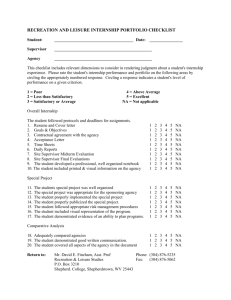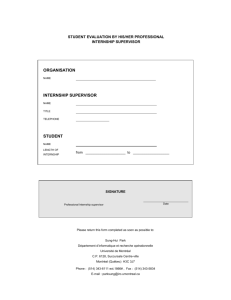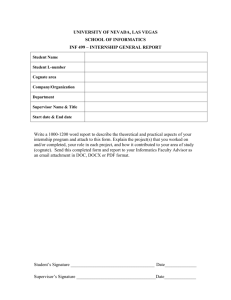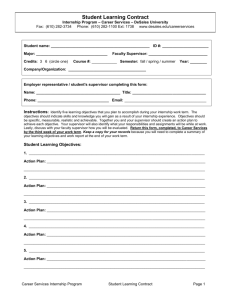Course Description for Independent Study/Internships in the UCF
advertisement
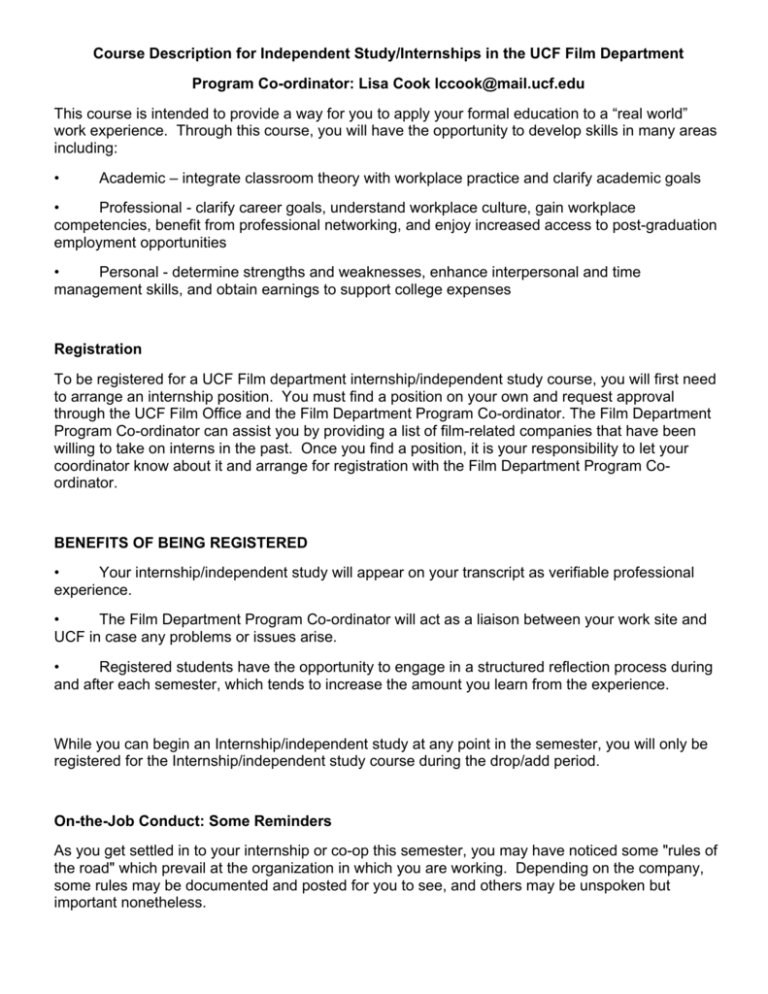
Course Description for Independent Study/Internships in the UCF Film Department Program Co-ordinator: Lisa Cook lccook@mail.ucf.edu This course is intended to provide a way for you to apply your formal education to a “real world” work experience. Through this course, you will have the opportunity to develop skills in many areas including: • Academic – integrate classroom theory with workplace practice and clarify academic goals • Professional - clarify career goals, understand workplace culture, gain workplace competencies, benefit from professional networking, and enjoy increased access to post-graduation employment opportunities • Personal - determine strengths and weaknesses, enhance interpersonal and time management skills, and obtain earnings to support college expenses Registration To be registered for a UCF Film department internship/independent study course, you will first need to arrange an internship position. You must find a position on your own and request approval through the UCF Film Office and the Film Department Program Co-ordinator. The Film Department Program Co-ordinator can assist you by providing a list of film-related companies that have been willing to take on interns in the past. Once you find a position, it is your responsibility to let your coordinator know about it and arrange for registration with the Film Department Program Coordinator. BENEFITS OF BEING REGISTERED • Your internship/independent study will appear on your transcript as verifiable professional experience. • The Film Department Program Co-ordinator will act as a liaison between your work site and UCF in case any problems or issues arise. • Registered students have the opportunity to engage in a structured reflection process during and after each semester, which tends to increase the amount you learn from the experience. While you can begin an Internship/independent study at any point in the semester, you will only be registered for the Internship/independent study course during the drop/add period. On-the-Job Conduct: Some Reminders As you get settled in to your internship or co-op this semester, you may have noticed some "rules of the road" which prevail at the organization in which you are working. Depending on the company, some rules may be documented and posted for you to see, and others may be unspoken but important nonetheless. The principles outlined below are designed to serve as guidelines for professional conduct. Following these principles will benefit all those involved in the experiential learning process, and will reduce the potential for problems. 1) During the work period, you are subject to your employer's rules and regulations regarding work hours, holidays, dress code, email/internet policies, etc. If you have any questions about these items, be sure to check with your supervisor. 2) Personal business conducted during work hours is strongly discouraged. This includes doing homework, using your cell phone for personal calls, or surfing the web. This also includes using employer resources such as photocopy machines, fax machines, telephones, and computers. 3) The use of controlled substances (alcohol or drugs) prior to or during work is prohibited. Some companies perform random and unannounced drug testing throughout the year, so using illicit drugs anytime you are employed anywhere is not only illegal, but it may result in termination. 4) Strive to be fair, considerate, honest, trustworthy, and cooperative when dealing with others at work. 5) All tasks should be carried out in a reliable and efficient manner. 6) A professional work ethic should be adopted which is in line with your personal values and the basic tenets of the field in which you are working. 7) Your effectiveness will be enhanced by your efforts to improve skills and acquire new knowledge. Therefore, during down times, ask yourself: "what could I be learning or doing?" "How can I contribute to the goals of my employer?" 8) If your supervisor approaches you with corrective feedback regarding your performance, realize this is a part of his or her job. Suggestions should be met with acceptance, and attempts should be made to improve performance. 9) Should any problems arise on the job (communication with supervisors or co-workers, conflicts between school and work, etc), notify your Internship/independent study coordinator immediately to help solve the problem in a timely and professional manner. 10) If you anticipate a change in your employment status, notify your Internship/independent study coordinator immediately. 11) Be positive, enthusiastic, and a problem-solver. Nothing will hurt you more than to have a negative and complaining attitude. A "can do" and willing attitude is always noticed. When you point out a problem, always have a suggestion on how it can be resolved. 12) Be realistic and be willing to take on less-than-glamorous tasks. Not every assignment will lead to glory, but the task may be important to your employer. Being attentive and giving 100% will be strong indicators of your work ethic and will lead to greater responsibility. 13) If a project comes along that interests you, ask to be involved. Demonstrate your organizational skills and initiative. Begin to develop new levels of responsibility by noticing the tasks around the office that need to be done, and asking your supervisor if you can take on the challenge. 14) Ask questions, but know when to listen and observe. In the beginning, you may notice processes or procedures that do not seem to make sense. Prior to criticizing, be sure to ask questions like "why is it done that way?" There may be history you do not know about. 15) Be willing to accept feedback and criticism. This is one of the hallmarks of a true professional. 16) Keep your supervisor informed. "No surprises" should be the motto here. If you have to arrive late one day, call. If you need more time on a project, ask for it. Keep the lines of communication open. 17) Seek out mentors and learn from colleagues. A mentor is someone who you feel you can learn from, and may or may not be your supervisor. If you think someone's job looks interesting, ask them how they got to that point in their career. 18) Dress for the position you want, not the position you have. How do your supervisor and colleagues dress? 19) Make a point to learn business etiquette. This includes standing to shake someone's hand who enters a room, not forwarding jokes using the company email system (even if someone forwarded it to you!), and using the right fork and spoon during company lunches. If you are unsure, find someone to watch and emulate. 20) REMEMBER: As a student intern, you are a representative of the Film Department and the University of Central Florida. Your behavior will determine how the outside world will form their opinion of UCF and will impact the options for all UCF students who come after you. Make us proud…
